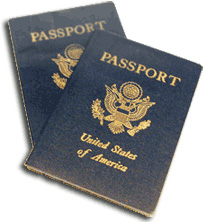 |
 |
 |
 News from Around the Americas | September 2006 News from Around the Americas | September 2006  
Congress OKs Delay on Border Passports
 Douglas Turner - buffnews.com Douglas Turner - buffnews.com


| | The House overwhelmingly passed a homeland security spending bill Friday that could delay until June 1, 2009, a mandate that Americans obtain passports or similar identification to cross the Canadian and Mexican borders. |
The House overwhelmingly passed a homeland security spending bill Friday that could delay until June 1, 2009, a mandate that Americans obtain passports or similar identification to cross the Canadian and Mexican borders.

The original deadline set by the Bush administration is Jan. 1, 2008.

The Senate passed the same bill late Friday by voice vote before adjourning for a pivotal midterm election in which national security will be a campaign theme. The $35 billion homeland security appropriations bill also calls for putting up a 700-mile fence on the Mexican border and a feasibility study on creating a new security system along 3,000 miles of Canadian border.

The bill provides for more detention beds for illegal immigrants, a larger Border Patrol force, money for local rescue agencies and reorganizing the Federal Emergency Management Agency, which was much criticized for fumbling the response to Hurricane Katrina.

But for Americans living near the Canadian border, the main question is whether they are going to have to buy passports in 15 months or 32 months.

For them, and the businesses that depend on trade and tourism, the legislation helps but offers no clear-cut victory.

Rep. Louise M. Slaughter, D-Fairport, said Friday night that the bill can delay implementation until June 1, 2009. But, she warned, it would also allow the Bush administration to fix a new deadline at any time three months after the government had completed all its plans, installed the equipment and trained its agents.

The leeway on timing given the Bush administration resulted from a compromise of a bitter fight among Republican leaders over the deadline. House Speaker Dennis Hastert, R-Ill., and a powerful committee chairman wanted the deadline to remain Jan. 1, 2008.

The delay until June 1, 2009, was contained in a bill called a Senate-House conference report on homeland security appropriations. Ordinarily, passage is deemed automatic. But Hastert held it up, and the White House was unhappy with the conference bill because it stripped out a provision Bush wanted that specified a type of technology to read the proposed electronic PASS cards.

Border state Republicans like Reps. Thomas M. Reynolds of Clarence, John McHugh of Watertown and John Sweeney of Clifton Park, weighed in against the leadership to get more time to perfect the new identification system.

Reynolds had been complaining for months about unending turf battles between the two agencies responsible for setting up the border ID program - State and Homeland Security.

He said he enlisted the aid of the White House on Wednesday to argue for more time. By then, the U.S. Chamber of Commerce and other business organizations that objected to the proposed travel restrictions had persuaded the White House to stay out of the fight.

Slaughter was among the House members who asked business organizations to lobby their representatives and the White House to retain the delay. The compromise was sealed on the House floor Friday in a prearranged, formal discussion, called a colloquy, among three committee chairmen.

"The conference report does not force a delay" in imposing the new ID requirements, said one of the chairmen, Rep. Harold Rogers, R-Ky., head of the appropriations subcommittee on homeland security.

Rogers urged the two departments to "quickly develop the PASS-card technology, 'readers' and procedures to enable the earliest possible deployment of the system."

The requirements for better ID cards will be imposed three months after the government perfects the program, and no later than June 1, 2009, "whichever is earlier," Rogers said.

A spokesman for a leading business organization who spoke on condition of anonymity said the government will be hard pressed to meet the other demands in the report.

Among them is a mandate to share all the ID technology with Canada and Mexico, alternatives for groups of children traveling with parental consent, training all government personnel for the new technology, and a single date for implementation for all sea and land travel.

Rep. Brian Higgins, D-Buffalo, said, "This plan shouldn't only be delayed, it should be scrapped entirely. In the interest of cross-border commerce and tourism, we should do everything possible to ensure this ill-conceived plan is never implemented."

dturner@buffnews.com | 
 | |
 |



